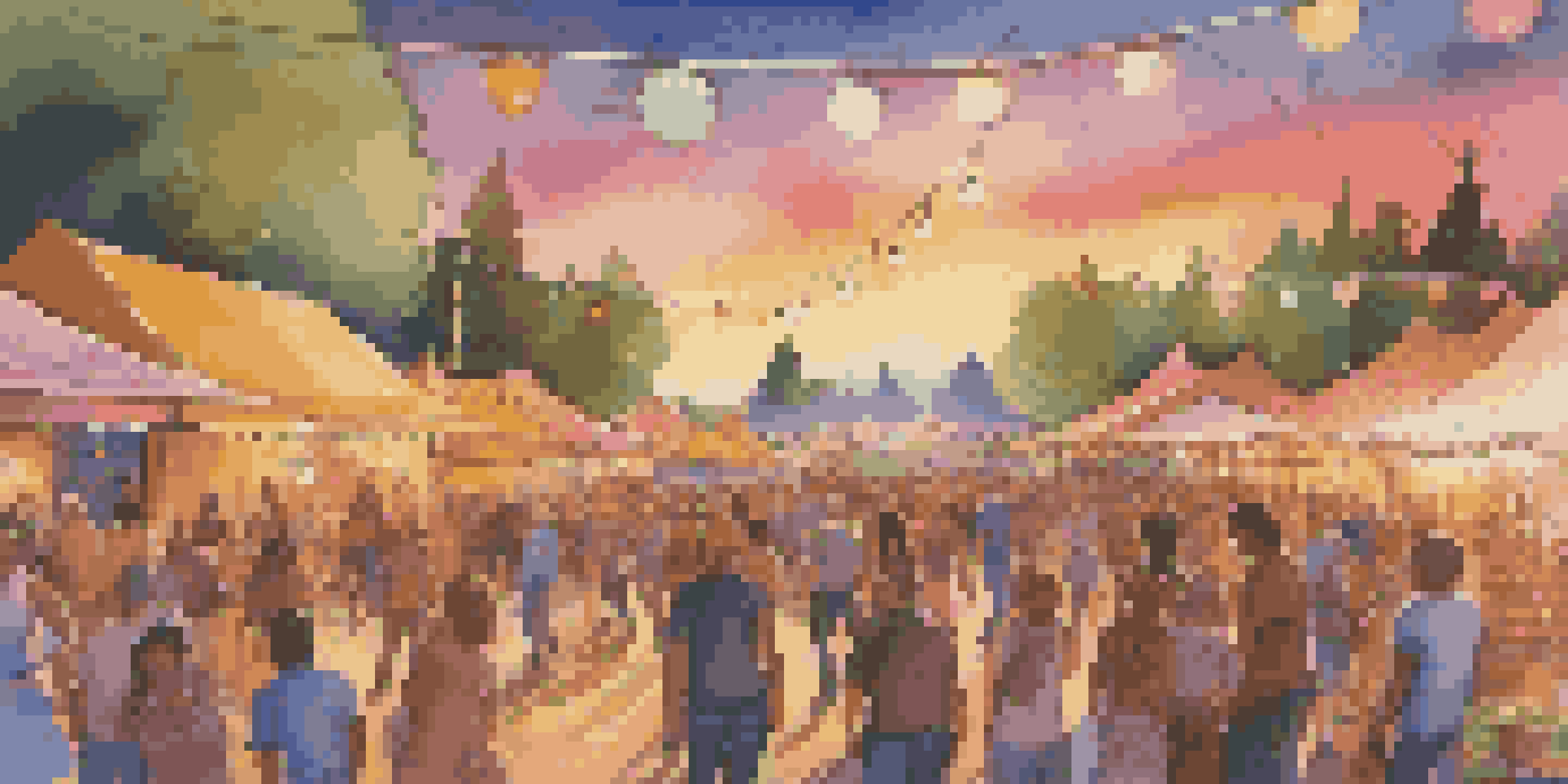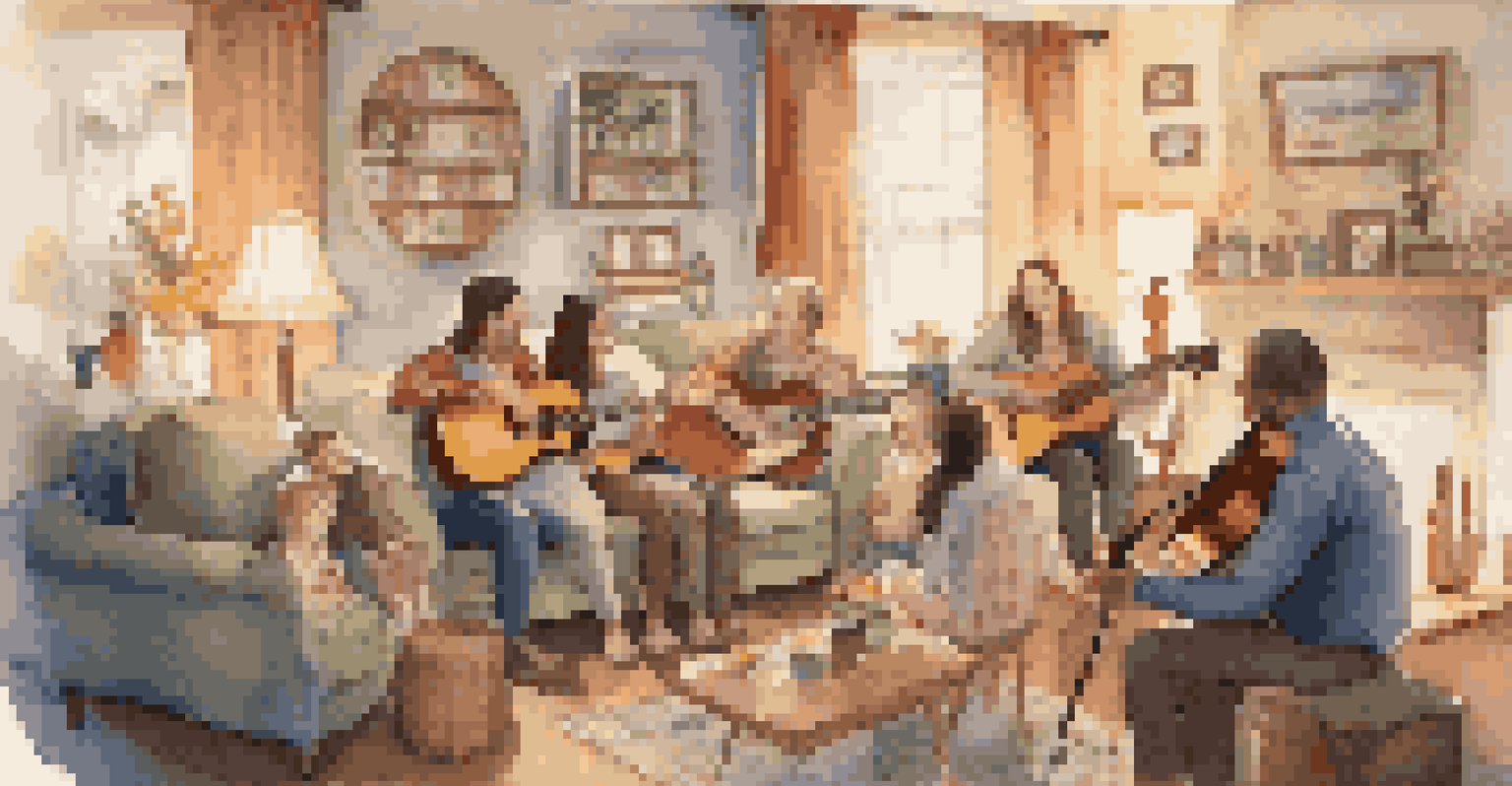The Language of Nostalgia: Music as a Universal Connector

Music as a Universal Language: Bridging Cultures
Music transcends language barriers, making it a powerful connector. Whether it's a catchy pop tune or a traditional folk song, melodies can evoke emotions that words often fail to express. This universal language allows people from different cultures to share experiences, fostering a sense of community.
Music can change the world because it can change people.
Consider how a song played at a wedding or a cultural festival can unite people, regardless of their backgrounds. When we hear familiar tunes, our hearts resonate with the shared memories they invoke. It’s as if music speaks directly to our core, reminding us of moments we cherish.
This connection through music isn’t just anecdotal; studies show that listening to music activates brain areas responsible for emotion and memory. The result is a profound reminder that, despite our differences, we all share the same emotional landscape.
Nostalgia in Music: A Trip Down Memory Lane
Nostalgia has a unique way of weaving itself into our musical experiences. Certain songs can immediately transport us back to specific moments in our lives, like the summer of our youth or a cherished family gathering. This emotional time travel is a powerful aspect of how we connect with music.

For instance, hearing a classic song from the 80s can evoke memories of dancing at school dances or road trips with friends. These songs become soundtracks to our lives, encapsulating feelings and memories that are often intertwined. Nostalgic music serves as a reminder of where we’ve been and who we’ve shared those moments with.
Music Connects Across Cultures
Music transcends language barriers, fostering community and shared experiences among diverse cultures.
In this way, nostalgia in music not only connects us to our past but also to others who share similar experiences. It creates a bond, often leading to conversations about shared memories, reinforcing the idea that we are never truly alone in our experiences.
The Role of Music in Shared Experiences
Music often plays a pivotal role in shared experiences, from concerts to family gatherings. These events create an atmosphere where people can come together and bond over the same rhythm and lyrics. The communal experience of live music can amplify feelings of joy and connection among attendees.
Where words fail, music speaks.
Take a concert, for example: thousands of fans singing along to their favorite songs creates a sense of unity. In that moment, everyone is connected by their love for the music and the artist, transforming a simple performance into a collective experience. This shared energy can be incredibly uplifting.
Moreover, music can also facilitate healing during tough times, bringing people together in remembrance or celebration. Whether it's a memorial service or a joyful celebration, the songs chosen resonate deeply with shared emotions, further solidifying our connections with one another.
The Science of Music and Emotion
The connection between music and emotion is not just poetic; it’s backed by science. Research shows that music activates the brain's reward system, releasing dopamine – the feel-good hormone. This physiological response plays a significant role in why certain songs can evoke strong emotions, including nostalgia.
When we listen to music, our brains process the melodies and harmonies, triggering memories associated with them. This process underlines the idea that music can be a powerful tool for emotional expression and connection. It's fascinating how a simple song can ignite a cascade of feelings and memories.
Nostalgia Shapes Our Musical Journey
Certain songs evoke powerful memories, creating emotional connections that bond us with our past and others.
Understanding the science behind this emotional response can enhance our appreciation for music as a universal connector. It highlights how deeply embedded music is in our lives and relationships, enriching our experiences and interactions with others.
Cultural Reflections: Music as a Mirror
Music often reflects the culture and societal changes of its time. From protest songs to love ballads, the themes in music can tell us a lot about the era in which they were created. This cultural dimension adds another layer to how music connects us, offering insights into shared values and experiences.
For example, songs that emerged during significant historical events often resonate with listeners long after their release. They serve as reminders of challenges overcome or moments of joy celebrated by entire communities. This cultural reflection fosters a sense of belonging and shared identity among listeners.
By examining the music of different cultures, we can gain a deeper understanding of their stories and struggles. This exploration not only enriches our appreciation of music but also connects us to the broader human experience, creating empathy and understanding.
Creating New Memories Through Music
While nostalgia draws on our past, music also plays a crucial role in creating new memories. Each time we listen to a song during a significant life event, we are crafting memories that we’ll cherish for years to come. Whether it's a wedding song or a favorite track played during a family vacation, these moments become part of our personal soundtrack.
Imagine a family gathering where a particular song becomes the anthem of laughter and joy. The next time you hear that song, it instantly brings back those happy memories, reinforcing the connection you have with that moment and the people you shared it with. Music has this magical ability to anchor our experiences in time.
Music Reflects Cultural Identity
Songs often mirror societal changes and shared values, helping us understand different cultures and fostering empathy.
As we continue to create new memories, we weave music into the fabric of our lives, ensuring that it remains a cherished connector. Each song carries the potential for new stories and shared moments, expanding our emotional repertoire and enhancing our connections with others.
The Future of Music and Connection
As we look to the future, the role of music in connecting people is only expected to grow. With advancements in technology, music is more accessible than ever, allowing us to discover new genres and artists from around the world. This accessibility broadens our horizons and deepens our connections with diverse cultures.
Platforms like social media and music streaming services have made sharing music easier, fostering global conversations around our favorite tunes. This interconnectedness creates opportunities for cross-cultural collaborations, enriching our musical landscape and encouraging unity through shared interests.

Ultimately, the future of music promises to continue its legacy as a universal connector. As we embrace new sounds and stories, we can look forward to a world where music remains a powerful force that brings us together, transcending boundaries and fostering understanding.